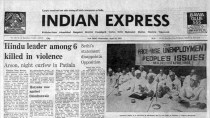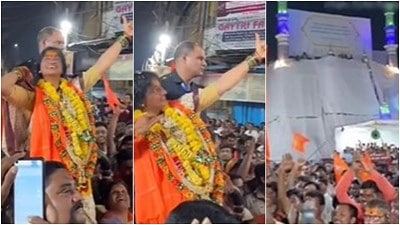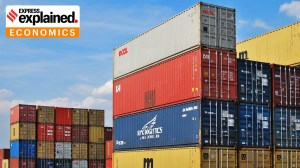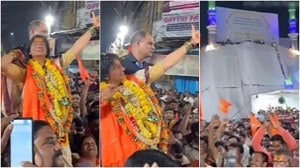- India
- International
With Jiang Zemin’s demise, a spotlight on Xi Jinping’s shortcomings
Vijay Gokhale writes: Jiang Zemin led China through a tumultuous time, exercised power with a light touch. The contrast with the current one-man leadership is stark for Chinese people.
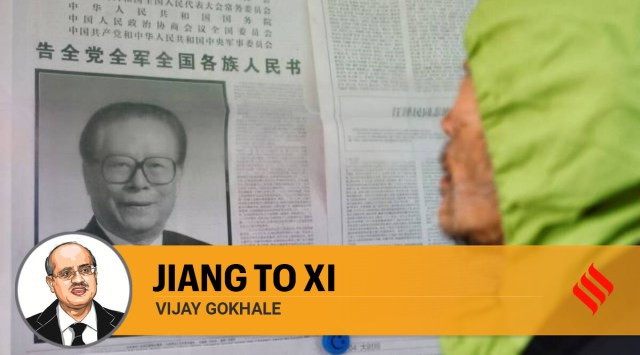 A man looks at a newspaper front page with an image of former Chinese President Jiang Zemin following his death, in Beijing, China December 2, 2022. REUTERS/Tingshu Wang
A man looks at a newspaper front page with an image of former Chinese President Jiang Zemin following his death, in Beijing, China December 2, 2022. REUTERS/Tingshu Wang Former Chinese Communist Party General Secretary Jiang Zemin’s demise in Shanghai on November 30 at the age of 96 could not have come at a more inconvenient moment for General Secretary Xi Jinping. Having capped a remarkable political journey at the 20th Party Congress in October 2022 with his appointment as the communist party’s general secretary for a third consecutive term, Xi was neither expecting his authority to be challenged so publicly by the anti-Covid protests nor his legacy to be compared so quickly with a predecessor whose era had been all but forgotten.
It is not as if Jiang’s political philosophy or objectives were vastly different from Xi’s. Jiang too was convinced that the West wanted to meddle in China’s internal affairs with a view to westernising China and weakening the communist party’s grip on power. Like Xi, he felt that the world was a turbulent place in which the old order had broken down but the new order had not yet been formed. And as is the case with China’s current leader, Jiang was also convinced that nothing could be achieved without stability, and that the party’s primary responsibility was to eliminate the factors that undermined it.
Even then, Jiang’s death revived memories of a different time in Chinese politics when the future seemed more optimistic and the country seemed more open. He was literally thrust into power when the natural order of succession determined by Deng Xiaoping and his contemporaries fell apart during the Tiananmen incident of 1989. With little experience in central politics and even less charisma, Jiang had to consolidate politically, balance between the pro and anti-reform factions and steer China through a unipolar world order. His challenge was to pull China out of economic backwardness and poverty and into the 21st century without large-scale social disorder or demands for political change as had happened in Eastern Europe. There was no precedent he could fall back upon. He was in uncharted waters.
If there are two defining features of his little more than 13 years as China’s leader (1989-2003), they are: He was willing to take the political risk to advance reform in core sectors such as state-owned enterprises and the cradle-to-grave social welfare system; and he was prepared to relax authoritarian control — relatively speaking — that would allow art, science, education, innovation and entrepreneurship to thrive. Both required skilful political management. There was a fine balance between relaxing controls but not allowing organised opposition, between expanding the party’s political base but not permitting the dilution of the party’s core ideology, and between allowing greater intellectual and religious freedoms but always within the unshakeable framework of the party’s leadership. It was Jiang who coined the phrase “socialist market economy” which allowed China to take advantage of its market in order to mobilise the enthusiasm of western business and industry for developing the country. The collective leadership principles that he followed were an important factor in maintaining party unity in dealing with problems that cropped up along the way.
Jiang was also concerned about China’s international image. He had no illusions about the West, but he feted and wooed the western leaders into believing that China would become a “responsible stakeholder” in a western-led liberal world order, if only the West helped them to develop without pressing them to change too quickly. In a seemingly unscripted television interview with Mike Wallace of CBS in September 2000, Jiang replied to difficult questions with disarming charm, even occasionally breaking into English. He sang Elvis Presley’s ‘Love Me Tender’ with Philippines President Ramos. At times he acted the buffoon, but he was also able to successfully convince the rest of the world that China was a normal country rather than a one-party-run state.

His death last week has spotlighted the many significant changes that the current Chinese leader has made in the two decades since Jiang demitted office. Collective responsibility has given way to a personality cult and heavy-handed state authority. Yet Xi was unable to prevent the protests that happened last week while nothing of this kind or on this scale happened on Jiang’s watch despite wrenching socio-economic reforms.
Xi has tightened political controls and centralised power. Yet that has not increased the efficiency in decision-making but appears to have lowered the risk-taking appetite that had propelled the rise of China in the 20 years between 1990 and 2010. Xi has clamped down on intellectual exchanges and entrepreneurial latitude that Jiang had allowed and which made China a science power and spawned world-class companies. Xi has not been able to devise an alternative system that would create similar conditions for the continued explosion of ideas, innovation and entrepreneurship. Neither has Xi been able to leverage China’s much greater power to win friends abroad in quite the same way that the bonhomie and warmth in Jiang’s sometimes clownish behaviour allowed him to build solid ties with world leaders and brought China great benefits, including membership of the WTO.
For somebody who was seen as a stop-gap arrangement, Jiang Zemin proved that leadership was about exercising power with a light touch. He might well be air-brushed from official propaganda, but his passing does not mean he will be forgotten. The vast majority of the Chinese people who prospered during his time in office are still active, and they will judge the actions of the current leader against Jiang Zemin’s legacy which, as I describe in my recent book, ‘After Tiananmen – The Rise of China’, was the most productive period in communist China’s 75 year rule.
Gokhale is author of After Tiananmen: The Rise of China and former Foreign Secretary
40 Years Ago
EXPRESS OPINION
More Explained
Apr 18: Latest News
- 01
- 02
- 03
- 04
- 05











